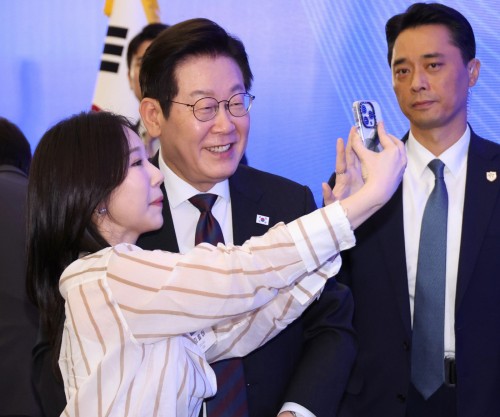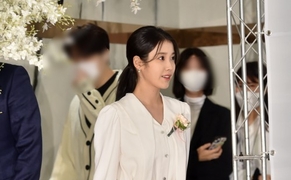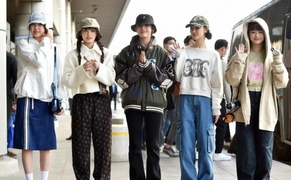 |
| President Lee Jae-myung takes a selfie with participants after attending the National Growth Fund report session at Front1 in Mapo District, Seoul, on September 10. / Source: Yonhap News |
On September 11, President Lee Jae-myung marked his 100th day in office, earning praise for maintaining approval ratings in the 60% range and solidifying his administration’s footing.
Born out of the turmoil of the Dec. 3 Martial Law crisis, the Lee government set out to restore national order under the banner of “people’s sovereignty” and “recovery and growth.” Despite concerns tied to negative labels such as “anti-U.S., pro-China,” “lone wolf,” and “judicial risks,” Lee has drawn recognition as a “president who gets things done.” His emphasis on strengthening the Korea-U.S. alliance and trilateral cooperation with Japan, alongside pragmatic moves toward bipartisanship, has resonated even with voters outside his traditional base. Swift execution of major pledges, including government restructuring, and hands-on involvement in local issues have further cemented support among his core backers.
Political analysts point to “pragmatic diplomacy” as the key factor behind Lee’s appeal among moderates and conservatives. He led a $350 billion U.S.-focused investment drive, highlighted by the MASGA (“Make America’s Shipbuilding Great Again”) initiative, and secured a 15% reciprocal tariff arrangement. His first overseas trip included a symbolic stop in Japan before meeting with President Donald Trump in Washington, signaling his commitment to seamless trilateral cooperation and a departure from the old “pro-U.S., pro-China” balancing act.
Lee also moved quickly on the economy. On his first day, he launched an emergency economic task force through his inaugural executive order. By July, just one month into his term, his administration issued consumer coupons to all citizens in a push to boost domestic demand.
His willingness to engage with the opposition has also drawn attention. Lee invited ruling People Power Party leader Jang Dong-hyuk to the presidential office in Yongsan only 13 days into Jang’s tenure, and became the first president in more than five years to sit down with both of the nation’s largest labor unions — moves consistent with his inauguration pledge to be “a president for everyone.”
Challenges remain. Disagreements with the ruling party over the pace of prosecutorial reform, as well as business concerns surrounding the “Yellow Envelope Law” and amendments to the Commercial Act, still need resolution. Details of the Korea-U.S. tariff agreement are pending, while unexpected issues — such as the recent detention of Korean workers in Georgia — underscore ongoing risks in bilateral ties.
“President Lee must demonstrate leadership to manage the extreme partisan standoff and issues like prosecutorial reform,” said Choi Chang-ryul, a special professor at Yongin University.
Most Read
-
1
-
2
-
3
-
4
-
5
-
6
-
7





















